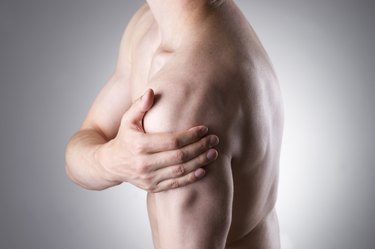
Each time you move a part of your body, you use tendons, which are specialized structures that attach muscles to bones. They're made of tough, nonelastic tissue -- called fibrous connective tissue -- that transfers the force produced when a muscle contracts. Tendons are found in most parts of your body, including your arms, legs, hands and feet, and even your head and torso. They come in many sizes and shapes, depending on their location and the movements they facilitate.
Shoulders and Arms
Video of the Day
Tendons of the shoulders and arms help move your arm up and down and rotate your arm at the shoulder. Other tendons help bend or straighten your elbow, rotate your forearm or bend your wrist.
Video of the Day
Rotator cuff tendons at the shoulder include: -- Teres minor tendons -- Infraspinatus tendons -- Supraspinatus tendons -- Subscapularis tendons
Tendons that help bend the elbow or rotate the forearm include: -- Deltoid tendons -- Biceps tendons -- Triceps tendons -- Brachioradialis tendons -- Supinator tendons
Tendons that help bend the wrist include: -- Flexor carpi radialis tendons -- Flexor carpi ulnaris tendons -- Extensor carpi radialis tendons -- Extensor carpi radialis brevis tendons
Hips and Legs
The upper part of your thigh bone -- the femur -- and part of your pelvis meet in the hip joint. Movement at the hip joint occurs when you bend backwards and forwards, and when you swing your leg while walking. Tendons that make this possible include: -- Iliopsoas tendons -- Obturator internus tendons -- Adductor longus, brevis and magnus tendons -- Gluteus maximus and gluteus medius tendons
Tendons that help you bend or straighten the knee include: -- Quadriceps tendons, which include the patellar tendon that contains the kneecap -- also called the patella -- Hamstring tendons -- Sartorius tendons
Tendons that cross the ankle joint and help move your foot up and down, or side to side, include: -- Gastrocnemius tendons, which include the Achilles tendon -- Soleus tendons -- Tibialis anterior tendons -- Peroneus longus tendons
Hands and Feet
Many tendons in your hands and feet attach to hand and foot bones, and help you move your fingers and toes. Examples that help finger movement include: -- Flexor digitorum longus tendons -- Interosseus tendons -- Flexor digitorum profundus tendons -- Abductor digiti minimi tendons
Your thumbs can move toward and away from your other fingers because of several tendons. These include: -- Opponens pollicis tendons -- Flexor pollicis longus tendons -- Extensor and abductor pollicis tendons
Tendons that help you bend and straighten your toes include: -- Flexor hallucis longus tendons -- Flexor digitorum brevis tendons -- Lumbrical tendons -- Abductor hallucis tendons -- Flexor digitorum longus tendons -- Abductor digiti minimi tendons
Head, Neck and Torso
Many other tendons help you move other parts of your body, and some of these are in your head. They help move your eyes, eyelids and jaw. They include: -- Ocular tendons -- Levator palpebrae tendons -- Masseter tendons -- Temporalis tendons
Tendons that attach parts of your head to your collarbone, breastbone, shoulder blades or bones in your back help you move your head and neck in different directions. They include: -- Trapezius tendons -- Sternocleidomastoid tendons -- Semispinalis capitis and splenius capitis tendons -- Mylohyoid and thyrohyoid tendons -- Sternohyoid tendons
Your torso contains tendons that twist and turn your body, maintain your posture, or bend and straighten your trunk. These include: -- Rectus abdominis tendons -- External oblique tendons -- Transversus abdominis tendons -- Latissimus dorsi tendons -- Erector spinae tendons
- Jorunal of Anatomy: Where Tendons and Ligaments Meet Bone -- Attachment Sites ('Entheses') in Relation to Exercise and/or Mechanical Load
- Tendon Injuries -- Basic Science and Clinical Medicine; Nicola Maffulli et al., Eds.
- Repair and Regeneration of Ligaments, Tendons and Joint Capsule; William Walsh, Ed.
Is this an emergency? If you are experiencing serious medical symptoms, please see the National Library of Medicine’s list of signs you need emergency medical attention or call 911.